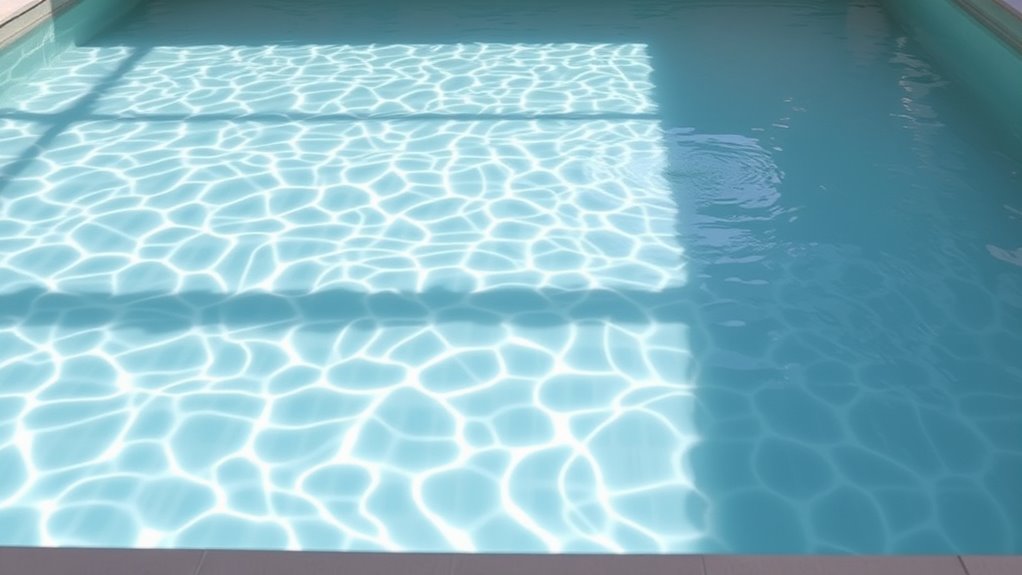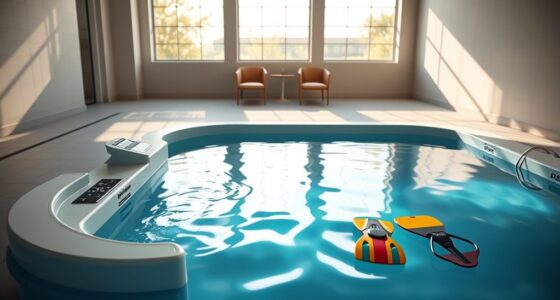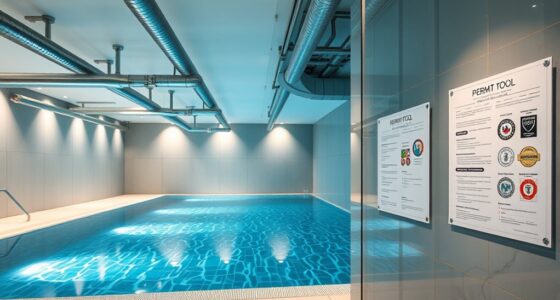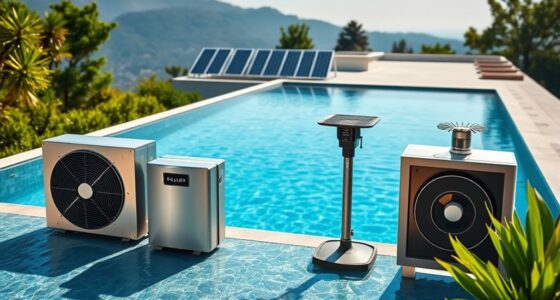Choosing between saltwater and chlorine for your endless pool depends on your preferences for comfort, maintenance, and costs. Saltwater pools offer a softer feel, fewer chemicals, and easier upkeep, but they require a higher initial investment and ongoing salt level checks. Chlorine pools are simpler to set up and control but can cause skin irritation and require regular chemical adjustments. To find out which system best fits your lifestyle, explore more details ahead.
Key Takeaways
- Saltwater pools offer softer water and less chemical handling, ideal for frequent swimmers seeking comfort.
- Chlorine pools are more cost-effective upfront and provide precise chemical control for customized sanitation.
- Saltwater systems generate chlorine automatically, reducing maintenance, but may cause equipment corrosion over time.
- Chlorine pools require regular chemical adjustments and may cause skin or eye irritation.
- Choose based on your budget, maintenance willingness, and skin sensitivity preferences for an optimal endless pool experience.
Understanding How Saltwater and Chlorine Systems Work

Saltwater and chlorine systems both serve to keep your pool clean and safe, but they operate in different ways. With a saltwater system, you add salt to your pool water, which then passes through a salt chlorine generator. This device uses electrolysis to convert salt into chlorine, continuously producing sanitizer while you swim. In contrast, a traditional chlorine system requires you to manually add chlorine in various forms, such as tablets or liquid, to disinfect the water. The chlorine then works to eliminate bacteria, algae, and other contaminants. Saltwater pools generate chlorine on-site, offering a steady supply, whereas chlorine pools depend on your regular addition of chemical treatments. Both methods aim to keep your water clear and hygienic, but their mechanisms differ markedly. Kia Tuning
Benefits and Drawbacks of Saltwater Pools
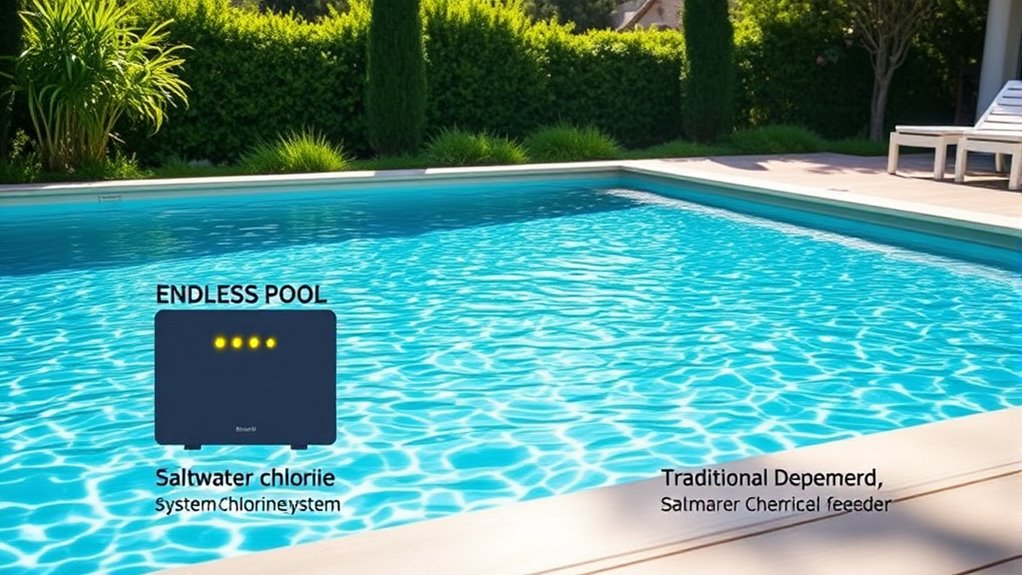
While saltwater systems offer a convenient way to generate chlorine automatically, they also come with distinct benefits and potential drawbacks. One major advantage is that saltwater pools tend to feel softer and gentler on your skin and eyes, providing a more comfortable swimming experience. They also reduce the need for frequent chemical adjustments, saving you time and effort. However, saltwater pools can be more costly upfront due to specialized equipment and ongoing maintenance. Salt can corrode certain pool components, like heaters and pumps, leading to additional repairs or replacements. Additionally, high salt levels may cause staining or damage to surrounding surfaces if not properly managed. Despite these drawbacks, many swimmers prefer saltwater for its ease and the smoother water feeling it provides. Furthermore, understanding the AI Security vulnerabilities involved in managing these systems can help prevent potential cyber threats and ensure safe operation.
Advantages and Disadvantages of Chlorine Pools
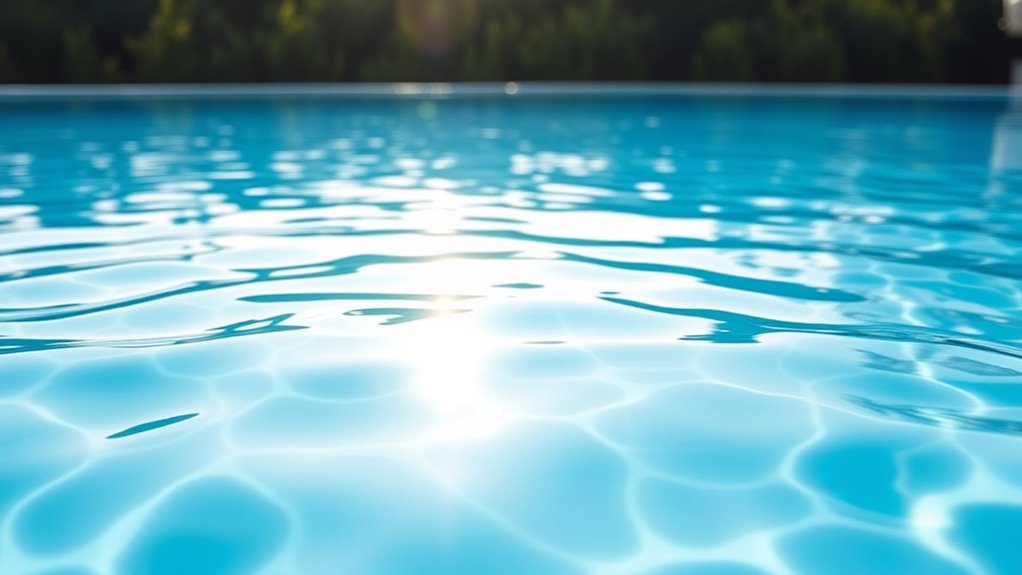
Chlorine pools remain the most common choice for many swimmers because they effectively disinfect the water, keeping it safe and clear. They’re straightforward to maintain and have well-established sanitation methods. However, chlorine can cause skin and eye irritation, especially if you’re sensitive or exposed for long periods. The strong chemical smell might also be unpleasant, and excessive chlorine levels can lead to dryness or respiratory issues. On the plus side, chlorine pools are typically more affordable upfront and have readily available supplies. They’re also easier to control with standard testing kits. Regular monitoring and balancing of chemicals are necessary to prevent over- or under-chlorination, which can impact water quality and your comfort. Additionally, contrast ratio plays a role in how well the water appears under different lighting conditions, affecting overall swimming experience. Overall, chlorine pools offer reliable disinfection but require diligent maintenance.
Cost Considerations and Maintenance Requirements
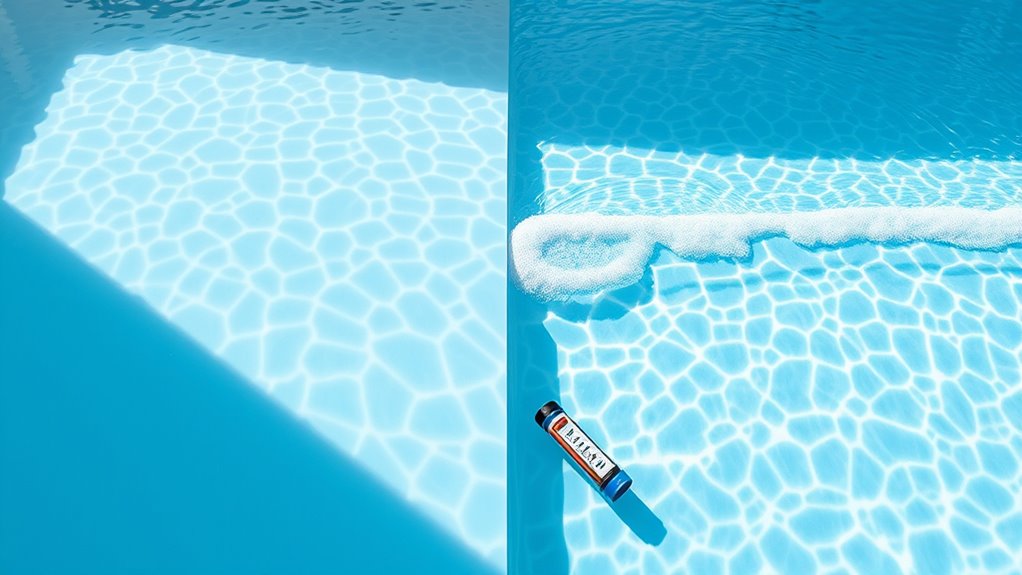
Cost considerations and maintenance requirements can substantially influence your choice between saltwater and chlorine pools. Saltwater systems usually have higher upfront costs because of the equipment needed, but they tend to be cheaper to operate long-term since they generate their own sanitizer. Chlorine pools often have lower initial expenses, but ongoing costs for purchasing chlorine and chemicals add up over time. Maintenance-wise, saltwater pools require regular monitoring of salt levels and occasional cell cleaning, which can be simpler once set up. Chlorine pools demand frequent chemical adjustments to maintain proper sanitizer levels and prevent algae growth. Both systems aim to improve system security, but they have different ongoing costs and maintenance demands, so consider your budget and willingness to perform routine upkeep when choosing.
Which System Suits Your Lifestyle and Pool Usage
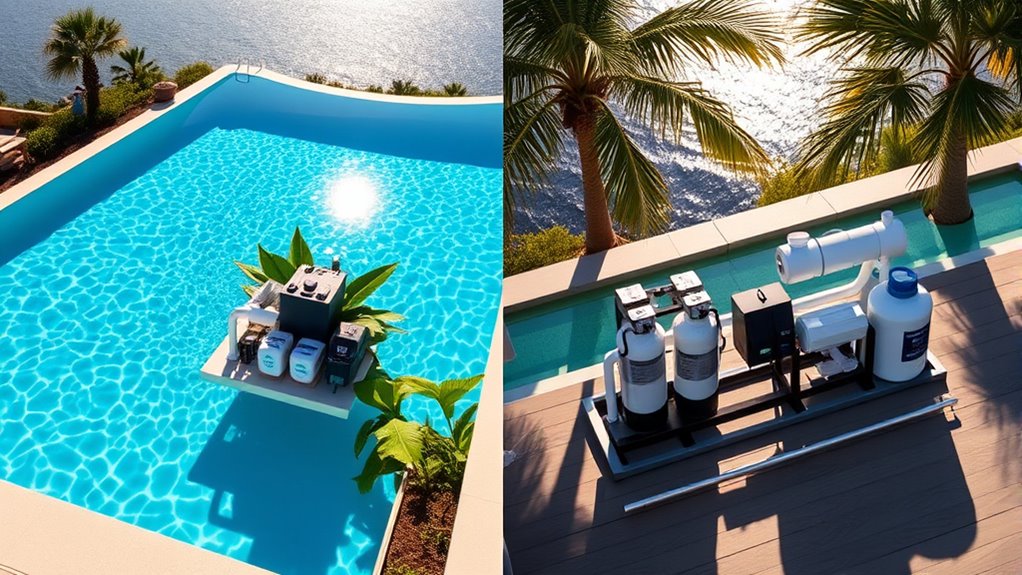
Choosing between saltwater and chlorine pools depends heavily on how you plan to use and maintain your system. If you swim frequently and want a low-maintenance option, a saltwater system might suit you better, as it requires less hand-on cleaning and fewer chemicals. On the other hand, if you prefer precise control over chemical levels and enjoy customizing your pool’s chemistry, chlorine could be more fitting. Consider your lifestyle—if you value simplicity and fewer harsh chemical smells, saltwater is a good choice. However, if you’re comfortable managing regular chemical adjustments and want a traditional setup, chlorine provides familiarity. Think about how often you’ll use your pool and how much time you want to dedicate to upkeep. Your choice ultimately depends on balancing convenience, control, and your pool’s usage frequency. Additionally, wall organization systems and accessories can help keep your pool area tidy and visually appealing, enhancing your overall experience.
Frequently Asked Questions
How Do Saltwater and Chlorine Systems Impact Pool Water Ph Levels?
Saltwater systems tend to keep your pool’s pH levels more stable, requiring less frequent adjustments, while chlorine pools often see more fluctuations. With saltwater, the pH can drift upward over time, so you’ll need to monitor and balance it regularly. Chlorine pools may experience sudden pH drops after adding chlorine. Regular testing and balancing are essential regardless of your system, but saltwater pools generally need fewer pH corrections.
Are There Any Health Risks Associated With Saltwater or Chlorine Pools?
Yes, there are health risks associated with both saltwater and chlorine pools. You might experience skin or eye irritation, especially if the chemical levels aren’t properly maintained. Saltwater pools can sometimes cause dryness or irritation due to salt content, while chlorine pools may lead to respiratory issues if chlorine levels are too high. To stay safe, regularly test and balance your pool’s chemicals, and shower after swimming.
Can Saltwater Systems Cause Corrosion in Pool Equipment?
Yes, saltwater systems can cause corrosion in your pool equipment. When salt interacts with metal parts like ladders, filters, and pumps, it accelerates rust and deterioration over time. To prevent this, you should use corrosion-resistant materials, regularly inspect your equipment, and maintain proper salt levels. Proper maintenance guarantees your pool stays in good condition and avoids costly repairs caused by salt-induced corrosion.
How Do Maintenance Routines Differ Between Saltwater and Chlorine Pools?
Think of maintaining your saltwater pool as tending a delicate garden, while chlorine pools are like sturdy, well-worn tools. For saltwater, you’ll check salt levels regularly, clean cell plates, and monitor pH to keep the ecosystem balanced. Chlorine pools require more frequent chemical additions, shock treatments, and filter cleaning. Both demand routine skimming and brushing, but saltwater pools often need less chemical fuss, making maintenance feel like a gentle breeze instead of a storm.
What Environmental Factors Influence the Choice Between Saltwater and Chlorine?
Environmental factors like your local climate, water quality, and nearby vegetation influence your choice. If you live in a sunny, warm area, saltwater systems may reduce chemical use and skin irritation, but they can be affected by high temperatures. Chlorine pools handle cooler, variable climates better and resist algae growth more easily. Consider your environment’s impact on maintenance, water chemistry, and your personal preferences to decide the best option.
Conclusion
Choosing between saltwater and chlorine is like picking the perfect dance partner for your endless pool. Both have their rhythms—one offers silky smooth waters, while the other keeps things simple and classic. Think about your lifestyle and how much time you want to spend caring for your pool. Whichever you choose, make it your trusted companion in turning your backyard into a personal oasis—your very own paradise waiting to be explored.
